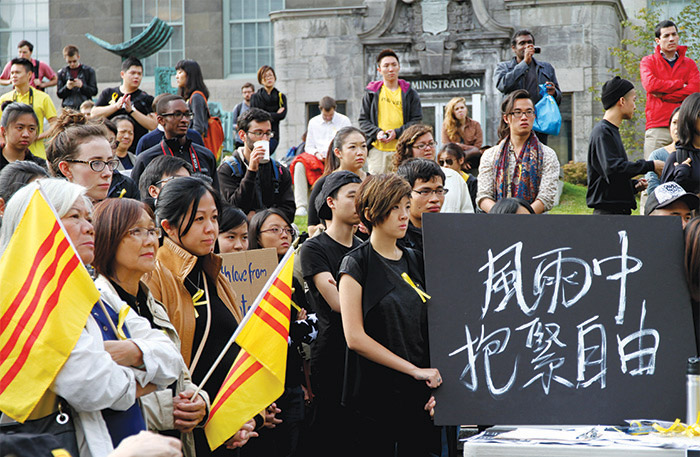The end of September was marked by a colossal movement in Hong Kong, with thousands of its citizens rallying around government headquarters and occupying several major intersections.
What spurred them to action was the Chinese government’s decision to restrict Hong Kong from holding elections for the 2017 Chief Executive election, as it had originally resolved to do in 2008 in response to pressure from pro-democracy activists.
Why doesn’t China give democracy advocates what they want? The primary concern in Beijing seems to be that Hong Kong might elect a leader who goes against the wishes of the mainland.
“If the chief executive [of Hong Kong] does not love the country and confronts Beijing, ‘one country, two systems’ would fail,”
Li Fei, the chairman of the Basic Law Committee in Hong Kong, explained.
The problem with this reasoning is that the Hong Kong Basic Law, the same constitutional document which implemented the ‘one country, two systems’ policy, promises universal suffrage for Hong Kong (Article 45). This means China is essentially voiding the policy by ignoring a part of the constitution. The government has exploited a loophole, enforcing an election in which the candidates will be chosen by a pro-Chinese committee, making Hong Kong voters choose one of China’s ‘approved’ leaders, defeating the whole purpose of an election system.
There also seems to be a dubious question being raised as to whether Hong Kong is ‘ready’ for democracy. Before the handover in 1997, the city lived for 150 years under the colonial rule of Great Britain with appointed governors. The movement towards universal suffrage is not a new concept for the people of Hong Kong. In 1985, they saw the first instance of an indirect election for the city’s legislature, a process where the voters do not elect the candidates directly, but choose individuals to make the decision. While far from what is being demanded today, this set the groundwork for democracy in Hong Kong.
In fact, even as early as a 1988 legislative election, there was substantial demand for citizen input, which the local government attempted to follow through on. However, this was eventually scrapped due to strong pressure from the mainland government. Since then, pro-democratic sentiments have grown, over time.
Evidently, the people of Hong Kong have faced and overcome many political obstacles throughout the region’s history. Perhaps the most notable event was in 2003, when then Chief Executive Tung Chee-Hwa pushed for the implementation of new laws which would allow increased police control over Hong Kong in order to arrest and punish ‘suspected terrorists’ working against the Chinese government. Outraged by the violation of their rights ,and also unhappy about Chee-Hwa’s reluctance to push for universal suffrage, 500,000 Hong Kong citizens marched against their chief executive, leading him to resign. With greater freedom of press and speech than in China, Hong Kong’s citizens had the means necessary to inform one another about political decisions and their implications. Furthermore, they were united enough to peacefully push their cause forward and form a historic movement in 2003, similar to what they are demonstrating today. The citizens of Hong Kong have shown that they are ready for real democracy, with thousands of people sacrificing their time and businesses to push for universal suffrage in an intelligent and unified manner. It is the Chinese government that is afraid of handing off power and, consequently breaking, constitutional promises in the process.









